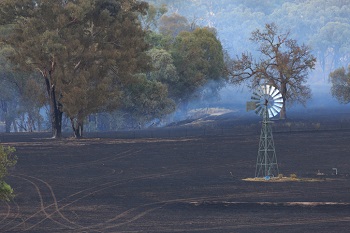If there is one thing a small farm owner can count on during a high-risk fire day, it’s that your local rural fire brigade probably won’t arrive in time to control a fire on your property. They are likely to be busy fighting fires elsewhere, as fire-fighting resources are often allocated to places where there is the greatest risk to life on high-risk fire days.
This can be a difficult fact to take on board for some new landholders, especially those living close to our larger regional towns and cities who are used to services being nearby and instantly available.

Living out of town and in a rural area is vastly different when it comes to fire-fighting services because of the much lower population densities and greater travelling distances between farms.
The message for small farm and lifestyle property holders is therefore clear: When it comes to fire-fighting and safety, you're largely 'on your own’, so you need to be prepared.
Bushfire safety – 4 simple steps to be prepared:
• Prepare your property and take action
• What will you do in the event of a fire?
• Know the conditions
• Keep the bushfire information websites, numbers and app
Your bushfire responsibilities under the law
With farm ownership also comes significant bushfire management responsibilities, even for small holdings. Each Australian state has its own legislation detailing the roles and responsibilities in rural bushfire management and control.
For example, NSW legislation is covered under the Rural Fires Act 1997. This particular piece of legislation makes it very clear that the onus is on the farm owner to prevent fires from starting, and if a fire does start, to have adequate resources to extinguish the fire before it spreads to neighbouring properties. If the owner fails to do this, they could be liable for any damage the fire causes.
Depending on the incident, the landholder could also be liable for prosecution under the Act if they fail to take reasonable steps regarding fire hazard management, or if they recklessly cause the fire in the first place – e.g. by lighting it during a high fire danger period.
The legislation is also very clear that reasonable steps must be taken regarding fire risk management and these should be based on the level of hazard. If there's a large fire hazard, then the property owner should have adequate measures in place to manage such hazards. This might mean, for example, that additional farm fire equipment is required beyond those needed to protect just the homestead.
Below are links to the relevant state and territory legislation to better understand your responsibilities:
• NSW Rural Fires Act 1997
• Queensland Fire and Emergency Service Act 1990
• Australian Capital Territory Emergencies Act 2004
• Victorian Country Fire Authority Act 1958
• Tasmania Fire Service Act 1979
• South Australia Fite and Emergency Services Act 2005
• Northern Territory Bushfires Management Act 2016
• Western Australia Bush Fires Act 1954
Practical steps
Fortunately, there's plenty of good information and very practical steps rural land holders can take to effectively manage and mitigate bushfire risk on their property. A good place to start is to simply get in touch with your local rural fire brigade and ask what they recommend. All rural fire brigades have open days specifically to cover general aspects of firefighting. Individual visits to properties to assess fire risks can usually be arranged as well. Attending open days and getting involved with the local rural fire brigade is also a great way to meet with your neighbours and engage positively with your community.
All Australian State rural fire services have checklists to assist landholders in preparing for the bushfire season and in helping make safe and sensible, 'stay and defend' or 'leave early’ decisions. The NSW Rural Fire Service has its own Farm Fire Plan, which includes 5 actions (clear/slash, burn, plough, rotate, prepare) to make your property safer.
Where to from here?
Whether you’re a new small farm owner or have been doing it for a while, the ‘Farm Fire Plan’ should be on every owner’s 'must do' list and should be reviewed annually. For more information regarding bushfire preparation and management visit Essential Bushfire Safety Tips.
Small farm insurance should also be reviewed annually to ensure it is up to date and a farm audit should be conducted on an annual basis, along with creating a farm asset schedule and photos.



